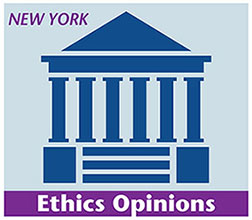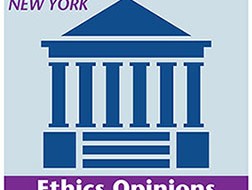Recent N.Y. Ethics Opinions: July/August 2015
By Tyler Maulsby, Associate, Frankfurt Kurnit Klein & Selz
Here are summaries of four ethics opinions issued in March and May 2015. The first three were issued by the NYSBA Committee on Professional Ethics, and the fourth by the NYC Bar Association Committee on Professional Ethics. NYLER will continue to provide updates on new ethics opinions issued by these and other ethics committees in New York State.
For information about how to obtain an ethics opinion from the NYS Bar Association Committee on Professional Ethics, please visit http://www.nysba.org/Ethics/.
For information about how to obtain an ethics opinion from the NYC Bar Association Committee on Professional Ethics, please visit http://www.nycbar.org/ethics/informal-ethics-opinions/.
NEW YORK STATE BAR ASSOCIATION OPINIONS
NYSBA Ethics Op. 1048 (March 3, 2015):
Waiver of Appeal on Grounds of Ineffective Assistance of Counsel as Part of a Criminal Plea
A criminal defense lawyer asked the Committee whether it was ethical to counsel his client to accept a plea that requires the defendant to waive his right to appeal on the grounds of, inter alia, ineffective assistance of counsel (an IAC Waiver). Though the Committee does not opine on issues of substantive law, the opinion initially analyzes whether IAC Waivers are generally enforced in New York in order to determine whether any ethical issues would arise or whether the lawyer could simply advise his client regarding the legal merit of the IAC Waiver. The opinion states: “[s]ince New York courts may enforce waivers at least as to other kinds of IAC challenges, the ethical issues cited in the inquiry do arise for a defense lawyer confronted with a blanket IAC waiver.” The relevant rules at issue are Rules 1.7 (personal interest conflicts), 1.8(h) (limitation of liability) and Rule 8.4(d) (conduct prejudicial to the administration of justice). With regard to Rule 1.7, the opinion notes that “the degree of the lawyer’s personal interest will be a factor in determining whether that interest gives rise to a Rule 1.7 conflict and, if so, in determining whether the conflict is waivable.”
The Committee then lists several factors that may give rise to a personal interest conflict in this context, specifically: (1) the likelihood that the defendant would make an IAC challenge in absence of the such a waiver; (2) the potential consequences that could result from such a challenge either directly or indirectly; (3) the seriousness of any detriment that the consequences would cause the lawyer; and (4) the chance that the waiver would avoid those consequences. Ultimately such a determination must be made on a case-by-case basis and, in many instances, a reasonable lawyer may not conclude that a personal interest conflict exists under Rule 1.7(a)(2). In the event of a personal interest conflict, however, the lawyer may still represent a client in connection with the plea if “the lawyer “reasonably believes that the [he] will be able to provide competent and diligent representation *** [and the client] *** gives informed consent, confirmed in writing,” Rules 1.7(b)(2) and (b)(4). If an unwaivable conflict exists, however, the lawyer must withdraw from representation. In such a situation “the new lawyer, having not previously represented the defendant and having no exposure for deficient representation up to that point, will likely be able to provide conflict-free representation.”
The IAC Waiver also is not “literally speaking” an agreement that “prospectively limit[s] the lawyer’s liability to a client for malpractice.” The defense attorney is not a party to the agreement and the IAC Waiver itself is not actually an instrument that limits the lawyer’s malpractice liability. Finally, the opinion concludes that the proposed conduct does not violate Rule 8.4(d), which prohibits attorneys from engaging in “conduct prejudicial to the administration of justice.” The Committee opined, “the fact that [IAC] waivers are accepted to a significant extent in case law belies any claim that advising a defendant as to a waiver would afoul of Rule 8.4(d).”
The full opinion is available at: https://www.nysba.org/CustomTemplates/Content.aspx?id=55623
NYSBA Ethics Op. 1049 (March 2, 2015):
Ethical Implications of Communicating with Potential Clients on Social Media
Opinion 1049 addresses two issues. First, when a potential client posts a message on a social media website (such as Reddit or Twitter) about a particular legal problem and asks to be contacted by a lawyer for further help, may a lawyer respond by email or through the website to the potential client’s request? Second, may an attorney post an invitation on a social media website for individuals who have experienced a particular legal problem to contact the attorney? The opinion analyzes whether both scenarios would constitute advertising and/or solicitation under Rules 7.1 and 7.3. Rule 7.3 requires that a solicitation be “an advertisement initiated by or on behalf of the lawyer or law firm ***. The primary purpose of which is the retention of the lawyer or law firm, and a significant motive for which is pecuniary gain.” For the communication to be a solicitation, therefore, it must first be an advertisement. Rule 1.0(a) defines an advertisement as a communication “made by or on behalf of a lawyer or law firm about that lawyer or law firm’s services, the primary purpose of which is for the retention of the lawyer or law firm.”
With regard to the first inquiry, the opinion reasons that if the communication is to discuss the lawyer’s services (as opposed to just the potential client’s legal problem), it would constitute advertising as long as the primary purpose of the communication is to secure retention. However, the opinion concludes that the communication would not constitute a solicitation so long as the lawyer responds in the manner invited by the potential client. With regard to the second inquiry, the opinion concludes that while a communication inviting potential clients to contact the lawyer regarding a particular issue is an advertisement, it may not be a solicitation depending on the level of specificity to the event in question. The opinion states, “[i]f the post referred to a particular incident, it would constitute a solicitation under the Rules” in which case the attorney must comply with Rule 7.3. Additionally, if the “specific incident” is one involving personal injury or wrongful death, Rule 7.3 requires the solicitation to comply with the relevant waiting period before the communication can be made.
The full opinion is available at: https://www.nysba.org/CustomTemplates/Content.aspx?id=55624
NYSBA Ethics Op. 1050 (March 25, 2015):
Charging Processing Fee on Credit Card Transactions Used to Pay for Lawyer’s Services
In Opinion 1050, a lawyer asked the Committee whether the lawyer may charge a processing fee to clients who pay their bills by credit card where processing fee is slightly larger than the amount charged by the credit card company to the lawyer for each transaction. The lawyer’s concern is that if he is only able to pass along the exact amount of the processing fee to the client he will never be able to recoup the full amount of the fee. For example, if a client pays the advance retainer by credit card and then subsequently wishes to pay the processing fee on the advance retainer by credit card there would then be a second processing fee charged by the credit card company to the lawyer for that transaction (which could theoretically go on ad infinitum). This situation could make credit card transactions impracticable for the client and lawyer alike. The opinion cites to Rule 1.5’s Comment [1], which states: “a lawyer may seek payment for services performed in-house ***. Either by charging an amount to which the client has agreed in advance or by charging an amount that reflects the cost incurred by the lawyer, provided in either case that the amount charged is not excessive.”
The opinion concludes that the lawyer may charge the client more than the processing fee imposed by the credit card company as long as “(i) the client receives disclosure of the up-charge and consents to it before the lawyer imposes it, (ii) the amount of the up-charge is nominal, and (iii) the total amount of the advance payment retainer and the processing fees charged (including the up-charge) are reasonable in the circumstances.” The opinion also notes that the question of when the up-charge becomes “excessive” under Rule 1.5 depends upon a variety of factors including: the amount of the up-charge, the amount of the advance payment retainer and the client’s opportunity to avoid the up-charge entirely by paying the advance retainer by cash or check.
The full opinion is available at: https://www.nysba.org/CustomTemplates/Content.aspx?id=55646
NEW YORK CITY BAR ASSOCIATION OPINIONS
N.Y. City Formal Ethics Op. 2015-4 (May 2015):
Duties of Local Counsel
Opinion 2015-4 addressees the ethical duties of lawyers who act as “local counsel” and the extent to which a New York attorney hired as local counsel may circumscribe her role by entering into an agreement to limit the scope of her representation. Rule 1.2(c) states that “[a] lawyer may limit the scope of the representation if the limitation is reasonable under the circumstances, the client gives informed consent and where necessary notice is provided to the tribunal and/or opposing counsel.” The opinion notes that a limited scope agreement “does not absolve a lawyer from complying with her ethical duties. Rather it narrows the universe within which those ethical obligations apply.” With regard to the tasks included in the representation, however, “the lawyer must still fulfill her ethical obligations” including the duty of competence (Rule 1.1), diligence (Rule 1.3) and communicating with the client about developments relevant to the representation (Rule 1.4). The opinion also notes that local counsel must comply with any relevant court rules governing the responsibilities of counsel. However, the interpretation of such rules is outside the scope of the Committee’s jurisdiction. Finally, the opinion provides examples of reasonable and unreasonable limitations on the scope of representation for local counsel.
The full opinion is available at: http://www2.nycbar.org/pdf/report/uploads/20072917-FormalOpinion2015-4DutiesofLocalCounsel.pdf
Get CLE Credit for this month’s articles (July/August 2015).
DISCLAIMER: This article provides general coverage of its subject area and is presented to the reader for informational purposes only with the understanding that the laws governing legal ethics and professional responsibility are always changing. The information in this article is not a substitute for legal advice and may not be suitable in a particular situation. Consult your attorney for legal advice. New York Legal Ethics Reporter provides this article with the understanding that neither New York Legal Ethics Reporter LLC, nor Frankfurt Kurnit Klein & Selz, nor Hofstra University, nor their representatives, nor any of the authors are engaged herein in rendering legal advice. New York Legal Ethics Reporter LLC, Frankfurt Kurnit Klein & Selz, Hofstra University, their representatives, and the authors shall not be liable for any damages resulting from any error, inaccuracy, or omission.
Related Posts
« Tinker, Tailor, Lawyer, P.I.: Are Your Workplace Investigations Complying with the Law? Understanding & Securing the LLP Shield in New York (Part 2) »







